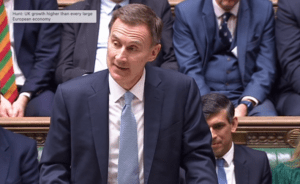Jeremy Hunt, the recently unseated chancellor, has dismissed accusations from Rachel Reeves regarding a supposed £22 billion fiscal gap as unfounded.
Despite stepping down from his position at No 11 Downing Street just a month ago, Hunt appears relieved and in good spirits as he addresses these claims.
In an interview with the Times, whilst relaxing at a café in Godalming, Surrey, Hunt seemed to relish his reprieve from the pressures of his former role. Yet, Reeves, his successor, has sought to undermine his legacy by accusing him of fiscal mismanagement. She asserts that Hunt’s policies have forced Labour into making unpopular decisions, including the cancellation of infrastructure projects and impending tax increases.
Hunt counters these allegations vigorously, labelling them as fictitious and a political manoeuvre. He highlights his historically cordial relationship with Reeves and expresses dismay at her tactics. He believes that her accusations are a significant misstep that the Conservative Party can exploit to challenge Labour’s justification for tax hikes in the upcoming budget.
To bolster his defence, Hunt has contacted Simon Case, the cabinet secretary, seeking clarity on the financial estimates approved just weeks before Reeves’s claims. He argues that if there had been such a substantial fiscal deficit, it would have been impossible for Treasury officials to overlook it or conceal it.
Addressing the notion of the alleged fiscal gap, Hunt points out that while pressures on public finances are perpetual, they are manageable through strategic planning and productivity improvements. He criticises Reeves for opting to implement £9.4 billion in public sector pay rises without addressing productivity inefficiencies, which he deems unsustainable.
Hunt also rebuffs claims regarding overspending on the asylum system and the use of the reserve fund. He criticises Labour’s decision to cancel the Rwanda scheme, arguing it has led to increased costs rather than savings.
Looking ahead, Hunt is preparing a counterattack while serving as shadow chancellor temporarily. He has urged the Conservative Party to address key issues such as immigration and the housing crisis to regain voter trust, particularly among younger demographics.
Reflecting on the Conservative Party’s recent electoral defeat, Hunt emphasises the need for strategic patience and learning from Labour’s approach under Keir Starmer. He remains confident in his own legacy, pointing to the current favourable economic indicators as evidence of his effective stewardship.
As the Conservative leadership contest unfolds, Hunt plans to return to the back benches, leaving his endorsement open but firmly advocating for policy-driven solutions to the party’s challenges.
Read more:
Hunt refutes Labour’s claims of fiscal ‘black hole’


























